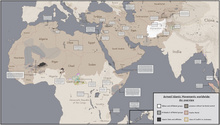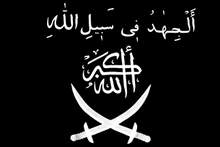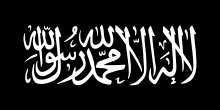Jihadism
[30] The term has also been invoked to retroactively characterise the military campaigns of historic Islamic empires,[31][32] and later the Fula jihads in West Africa in the 18th and 19th centuries.
[44] "Jihadism" has been defined otherwise as a neologism for militant, predominantly Sunnī Islamic movements that use ideologically motivated violence to defend the Ummah (the collective Muslim world) from foreign Non-Muslims and those that they perceive as domestic infidels.
Furthermore, as the cases of Saudi and other Gulf regimes show, states may gain domestic legitimacy through economic development and social change, rather than based on religion and piety".
[57] Shīʿas believe ʿAlī ibn Abī Ṭālib is the true successor to Muhammad, while Sunnīs consider Abu Bakr to hold that position.
[21] He was a prominent leader of the Muslim Brotherhood and a highly influential Islamist ideologue,[21][62] and the first to articulate these anathemizing principles in his magnum opus Fī ẓilāl al-Qurʾān (In the shade of the Qurʾān) and his 1966 manifesto Maʿālim fīl-ṭarīq (Milestones), which lead to his execution by the Egyptian government.
Amongst his notable ideas included reviving the traditions of the early Muslim generations (Salaf) as well ridding the Islamic World of Western influences and Jahiliyya by specifically looking up to the model of Khulafa Rashidun.
Rida's ideas would set the foundations of future Salafi-Jihadist movements and greatly influence Islamists like Hasan al-Banna, Sayyid Qutb, and other Islamic fundamentalist figures.
[85][86][87][88] Going radically further than his predecessors, Qutb called upon Muslims to form an ideologically committed vanguard that would wage armed Jihad against the secular and Western-allied governments in the Arab World, until the restoration of Islamic rule.
"[93] An explanation for jihadist willingness to kill civilians and self-professed Muslims on the grounds that they were actually apostates (takfīr) is the vastly reduced influence of the traditional diverse class of ulama, often highly educated Islamic jurists.
In "the vast majority" of Muslim countries during the post-colonial world of the 1950s and 1960s, the private religious endowments (awqāf) that had supported the independence of Islamic scholars and jurists for centuries were taken over by the state.
[99] De-Ba'athification policy initiated by the new government led to rise in support of jihadists and remnants of Iraqi Ba'athists started allying with al-Qaeda in their common fight against the United States.
One of these was the insistence on an operational link between Iraq and al-Qaeda... after the fall of the regime, the most potent ideological force behind the insurgency was Islam and its hostility to non-Islamic intruders.
Salafia Jihadia has variously been described as a movement or loose network of groups, or as a generic term applied by Moroccan authorities for militant Salafi activists.
[122] Al-Qaeda evolved from the Maktab al-Khidamat (MAK), or the "Services Office", a Muslim organization founded in 1984 to raise and channel funds and recruit foreign mujahideen for the war against the Soviets in Afghanistan.
By the end of 2015, their self-declared caliphate ruled an area with a population of about 12 million,[133][134] where they enforced their extremist interpretation of Islamic law, managed an annual budget exceeding US$1 billion, and commanded more than 30,000 fighters.
[135] After a grinding conflict with American, Iraqi, and Kurdish forces, IS lost control of all their Middle Eastern territories by 2019, subsequently reverting to insurgency from remote hideouts while continuing their propaganda efforts.
[147][148] In 2011, Salafist jihadists were actively involved with protests against King Abdullah II of Jordan,[149] and the kidnapping and killing of Italian peace activist Vittorio Arrigoni in Hamas-controlled Gaza Strip.
[154] According to Swedish researcher Magnus Ranstorp, Salafi-Jihadism is antidemocratic, homophobic and aims to subjugate women and is therefore opposed to a societal order founded on democracy.
[154] The report found that Middle Eastern nations are providing financial support to mosques and Islamic educational institutions, which have been linked to the spread of Salafi-Jihadist materials which expoused "an illiberal, bigoted" ideology.
[160] In August 2018, after the European Court of Human Rights approved the decision, French authorities deported the Salafi-Jihadist preacher Elhadi Doudi to his home country Algeria because of his radical messages he spread in Marseille.
The first wave involved the establishment of an Islamic territory centered on Thana Bhawan by the movement's elders during the Indian Rebellion of 1857, before the founding of Darul Uloom Deoband.
In 1994, he gathered a group of students and religious scholars, many of whom had received their education in Deobandi madrasahs located in Khyber Pakhtunkhwa and Balochistan, and established the Taliban as a political and military movement.
[179] Scholars like Abul Ala Maududi, Abdullah Azzam, Ruhollah Khomeini, leaders of al-Qaeda and others, believe that defensive global jihad is a personal obligation, which means that no caliph or Muslim head of state needs to declare it.
Military and intelligent analyst Sebastian Gorka described the new interpretation of jihad as the "willful targeting of civilians by a non-state actor through unconventional means.
"[180][173] Al-Qaeda's splinter groups and competitors, Jama'at al-Tawhid wal-Jihad and the Islamic State of Iraq and Syria, are thought to have been heavily influenced[174][181][182][183][184] by a 2004 work on jihad entitled Management of Savagery (Idarat at-Tawahhush),[174] written by Abu Bakr Naji[174] and intended to provide a strategy to create a new Islamic caliphate by first destroying "vital economic and strategic targets" and terrifying the enemy with cruelty to break its will.
[174][186][187][188][189] The book has been described by counter-terrorism scholar Orwa Ajjoub as rationalizing and justifying "suicide operations, the mutilation of corpses, beheading, and the killing of children and non-combatants".
[174] The Guardian's journalist Mark Towsend, citing Salah al-Ansari of Quilliam, notes: "There is a startling lack of study and concern regarding this abhorrent and dangerous text [The Jurisprudence of Blood] in almost all Western and Arab scholarship".
[187] He states: Ranging from ruminations on the merits of beheading, torturing, or burning prisoners to thoughts on assassination, siege warfare, and the use of biological weapons, Muhajir's intellectual legacy is a crucial component of the literary corpus of ISIS—and, indeed, whatever comes after it—a way to render practically anything permissible, provided, that is, it can be spun as beneficial to the jihad.
[...] neither Zarqawi nor his inheritors have looked back, liberally using Muhajir's work to normalize the use of suicide tactics in the time since, such that they have become the single most important military and terrorist method—defensive or offensive—used by ISIS today.
He assesses that jihadists regard their actions as being "for the greater good"; that they are in a "weakened in the earth" situation that renders Islamic terrorism a valid means of solution.











